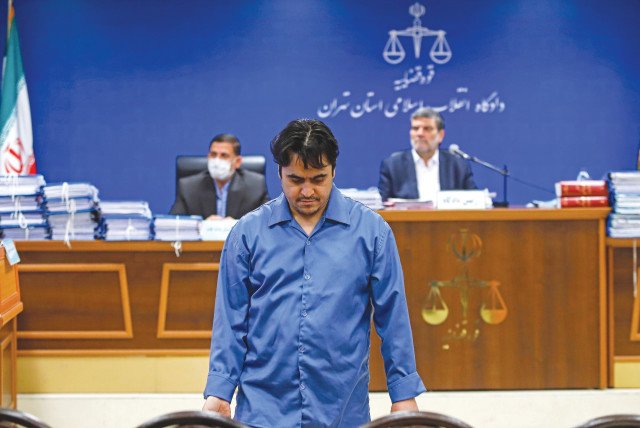Iran's threats to BBC staff escalate

In recent months, Iran has intensified its harassment and threats against journalists working for the BBC's Persian service and their families, the British broadcaster reports.
Ruhollah Zam, a dissident journalist captured in what the Iranian government calls an intelligence operation, speaks during his trial in Tehran on June 2, 2020. Photo credits: Reuters.
As part of a complaint filed with the United Nations this month, the BBC called on the UN to "condemn Iran's unacceptable treatment" of its staff.
It cited "extra-territorial threats" against the journalists in Britain and abroad; harassment of family members in Iran; financial pressures on the journalists and their families; and "increased intelligence and counter-intelligence activity aimed at undermining the professional reputation of BBC News Persian and its journalists."
Kasra Naji, BBC Persian special correspondent in London, said the problem has persisted for years. However, the threats have recently increased.Naji told VOA News that the situation has escalated. Iran's intelligence agency interrogated several family members of BBC Persian personnel over the course of six weeks
“They told our parents and brothers and sisters that we in London could be the target of kidnapping, or even killing, if we didn’t stop working for the BBC,” Naji said to VOA. “They also suggested that we could be kidnapped and renditioned to Iran.”
Naji said the agents cited the case of Ruhollah Zam as an example of what would happen if they didn't comply.
Zam founded an anti-government news website and Telegram channel while living in exile in Paris and was lured back to Iraq after being promised an interview with a prominent cleric.
Instead, he was sent to Iran, where the Revolutionary Court convicted him of "corruption on Earth" and executed him in December 2020.
Caoilfhionn Gallagher and Jennifer Robinson, the counsel for the BBC World Service, said in a joint statement, “We know from Iran’s past actions that it is willing to take cross-border and deadly action to silence its critics, and that it perceives independent journalism about Iran as a risk to their power.”
Naji says the threats don’t appear to be linked to any particular story and haven’t impacted BBC Persian reporting.The BBC told our parents and brothers and sisters that we could be kidnapped or killed if we didn't stop working for them," Naji said. “They also suggested that we could be kidnapped and renditioned to Iran.”
The agents cited the case of Ruhollah Zam as an example of what would happen if they didn’t comply, Naji said.
Zam, who founded an anti-government news website and Telegram channel while in exile in Paris, was lured to Iraq in 2019, where he had been promised an exclusive interview with a prominent cleric.
Instead, he was forcibly returned to Iran where the Revolutionary Court convicted him of “corruption on Earth” and executed him in December 2020.
In a joint statement, human rights lawyer Caoilfhionn Gallagher and Jennifer Robinson, counsel for the BBC World Service, said, “We know from Iran’s past actions that it is willing to take cross-border and deadly action to silence its critics and that it perceives independent journalism about Iran as a risk to their power.”
Naji says the threats do not appear to be related to any particular story and have not affected BBC Persian reporting.
As a result of Tehran's repressive media environment, many journalists work in exile. But living outside of Iran is no guarantee of security. As VOA reported, "transnational repression, in which governments reach across borders to coerce, intimidate, and sometimes harm or even kill citizens, is becoming a widely used tactic by authoritarian regimes, groups including Freedom House have said".

